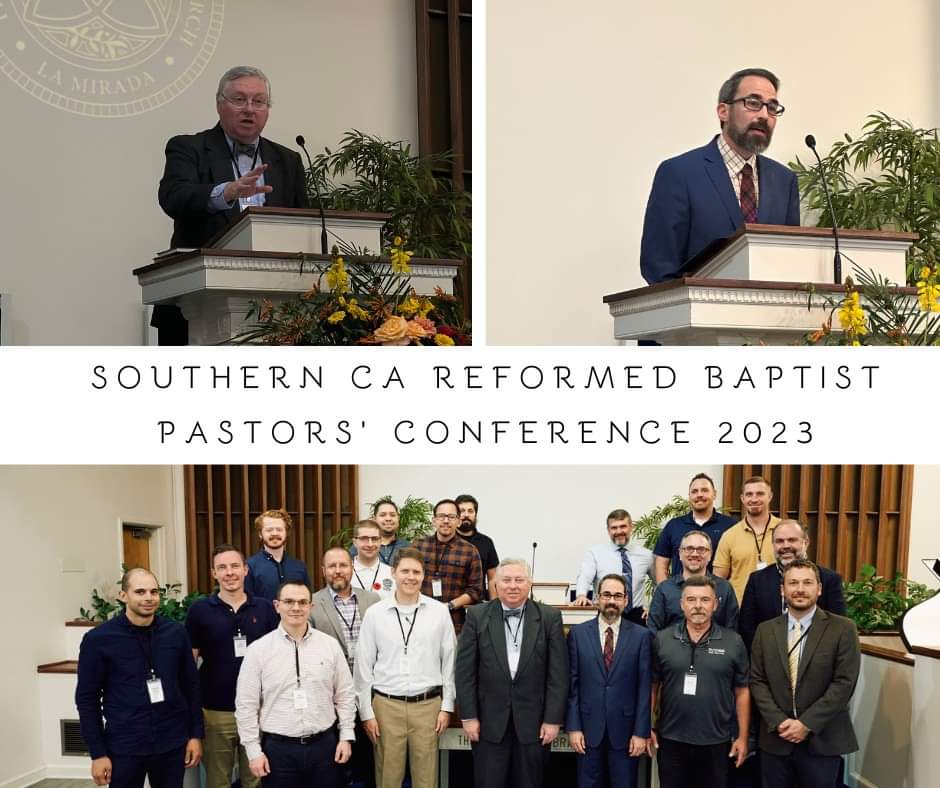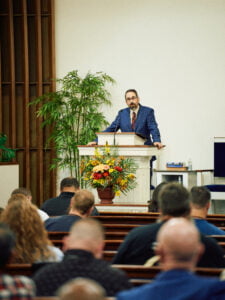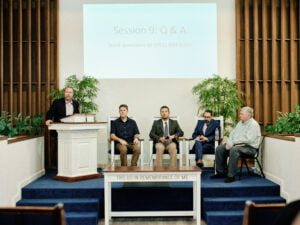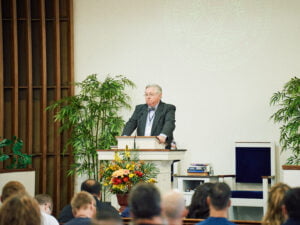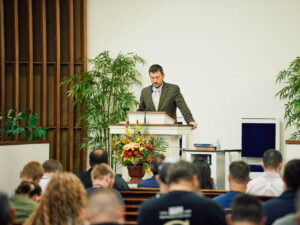In early November, I had the opportunity to attend the Southern California Reformed Baptist Pastors’ Conference (SCRBPC) at the Trinity Reformed Baptist Church in La Mirada beside Nathan Neels, Carla Neels, Phil Hutchings, and Justin Hutchings. While the conference was originally a small-scale pastor’s conference, it has evolved into the premiere Reformed Baptist event in the western half of the United States. Dr. James M. Renihan, the president of the International Reformed Baptist Seminary (IRBS), has famously joked about how the conference is essentially an “IRBS fest” since the majority of the attendees and speakers are either IRBS alumni, professors, or students. Consequently, I would encourage everyone to locate recordings of this year’s conference as well as past conferences. For all intents and purposes, this conference is a unique glimpse into the cutting edge of Reformed Baptist scholarship.
Every year, the conference concentrates on a successive chapter of the confession. This year, the conference was focused on the doctrine of man’s free will from 2LCF 9. As I reflect on the material a month later, the following points stand out.
First, the fact that confessional Baptists like ourselves should not be shy about affirming that man has free will. Now, obviously, we would qualify that insofar as we do not affirm that man has libertarian freedom or exercises agency in any way that is independent of divine sovereignty, but rather, we would hold that man is responsible for his sin. In rejecting fatalism, we confess God’s perfect justice in judging man both in this life and in the eternity to come for holding him responsible for his violations of God’s holy law.
Second, Dr. J. Ryan Davidson delivered a fantastic lecture explaining his approach to Christian counselling. In noting that we hold that man consists of both immaterial and material parts – that is, man consists of both body and reasonable soul – the pastor or counselor must approach people noting the interplay between physical and spiritual issues. Sometimes, physical problems have spiritual causes; and sometimes, spiritual problems have physical causes. A materialist or secularist approach that denies the immaterial or spiritual aspect of man will treat behavioral, mental health, or other issues as nothing more than chemical balances. Some Christian approaches effectively undermine the physicality of man such that everything boils down to a spiritual issue. Consequently, the goal is to use strategic questions that drill into the multiple layers of conflicts, problems, and patterns of sin. Behavior is at the surface of emotional, thought-based, and ultimately, heart problems. In sum, Reformed anthropology has significant pastoral and practical implications.
Third, Dr. Samuel Renihan delivered an amusing presentation about the last wills and testaments that Particular Baptist laity would deliver before leaving this world. I was amazed at the deep theological reflection that saints would spend their last hours pursuing. To see brethren make a point of celebrating a lifetime in Christ’s care and speaking of how they looked forward to commending their souls to the Saviour was quite stirring. Indeed, these statements were a sermon unto themselves. May God help us to be faithful until the end as these saints were.
Fourth, considering man’s will as it relates to his bondage in sin prior to regeneration reminds me of how thorough the defilement of sin can be. In 2LCF 6.2, the confession describes man’s state as “dead in sin, and wholly defiled in all the faculties and parts of soul and body.” That is, man does not lose his agency or will, but rather, his agency and will are permanently reoriented towards perverse ends unless an external force acts upon him. Thus, even as we ponder our rescue from the slave market of sin, we must not underestimate the serpent’s venom and the power of his temptations as he assaults our souls on a daily basis.
Finally, by implication, one’s doctrine of man and the will has impacts for our view of Christ’s incarnation. As we enter the Christmas season and ponder our Lord’s humanity whereby He enters our world, assumes true humanity, and undergoes everything we experience, and yet is without sin from first to last, we would do well to consider that Christ actively and genuinely obeyed God’s law personally, entirely, exactly, and perpetually. His active obedience and true humanity were not illusory phantoms. He is the one person who consistently fulfilled mankind’s purpose relative to His Father. We are justified and redeemed precisely because of His active obedience whereby He used His will correctly and properly at all times. And therefore, a lifetime of using His will to obey the Father properly set the stage for Christ to offer Himself as a perfect sacrifice on our behalf through His passive obedience. In sum, Christmas and Easter are intimately intertwined. May God grant us the opportunity to use our spare time during this holiday season to ponder the gospel and the glory of Christ’s incarnation.
As the first stanza of Philip Bliss’ hymn states:
Man of sorrows what a name
for the Son of God, who came
ruined sinners to reclaim:
Hallelujah, what a Savior!
And thus, let us never forget that Christ truly was a “man of sorrows” and “acquainted with grief” (Isa. 53:3). He truly can “sympathize with our weaknesses” as our “great High Priest” who invites us to the “throne of grace” (Heb. 4:14–16). What a Saviour, indeed!
Pictures courtesy of Mike Thezier.

